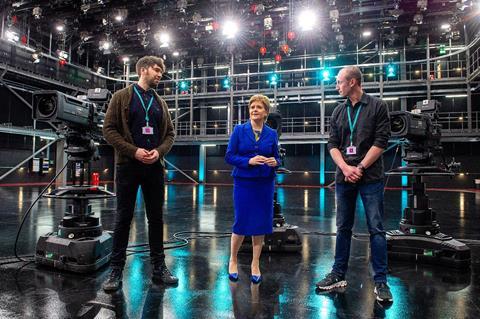The event was attended by Scotland’s first minister Nicola Sturgeon

BBC Studioworks’s Kelvin Hall, Glasgow studio was officially unveiled this week, after first opening in September last year. It was booked out with productions since launch, but, taking advantage of a gap before the next client takes up home at the studio space, Scotland’s first minister Nicola Sturgeon visited the facility to take a tour around and publicise its opening.
The 10,500 sq ft purpose-built studio is in the heart of Glasgow’s West End in the iconic Kelvin Hall building, and has already housed BBC1 quiz show Bridge of Lies, produced by STV Studios (33 episodes) and BBC2’s Frankie Boyle’s New World Order, produced by Zeppotron (seven episodes of which were recoded with a 300 strong studio audience).
The studio was co-funded by the Scottish Government (through Screen Scotland and Glasgow City Council) to fuel the growth of Scotland’s creative workforce. Many of the questions from invited press at the event were centred on wider political issues, however, asked by one journalist about her opinions on the new studio, Sturgeon said it was “a state-of-the-art studio with fantastic facilties.”
She added: “BBC Studioworks is a welcome addition to Scotland’s existing range of studio space and is already delivering expertise in the entertainment genre and supporting existing skills and training schemes to further develop a sustainable creative economy.
“The studio will help meet the growing demand for Scottish film and high-end television production, and its opening provides a further boost to a building that has played a key role in Glasgow’s cultural and sporting life.”
Training
With the growing demand to make more TV shows and films in Scotland, the requirement for local, skilled production crews has increased significantly. To address this, the Multi-Camera TV Conversion Programme, supported by BBC Studioworks, Screen Scotland and Glasgow City Council aims to support the development of a skilled, dynamic and diverse workforce. It has been designed to strengthen existing skills, provide on-the-job training and encourage new entry points into the industry.
BBC Studioworks provides paid work placements for each of the programme participants, giving them the opportunity to translate their learnings into practical skills and work alongside experienced TV production professionals.
Andrew Moultrie, CEO BBC Studioworks said: “Three years ago, we started a conversation with the Glasgow City Council and Screen Scotland where we shared a vision of creating a world class TV facility, based in central Glasgow, operated by Glaswegians and used as a hub to grow the future talent of the global entertainment sector.
“Today, with their support, we deliver that vision through a sustainable state-of-the-art TV studio at Kelvin Hall with best-in-class operational capabilities and real work opportunities for local Glaswegians.”
David Smith, Director at Screen Scotland added: “BBC Studioworks first started discussing the potential for a new state-of-the-art entertainment studio with Screen Scotland in early 2020. The Scottish Government and Glasgow City Council immediately recognised the potential when we raised the opportunity with them, and we have all worked together to deliver this opportunity for Scottish TV producers and crew.”
Councillor Susan Aitken, leader of Glasgow City Council, said: “The state-of-the-art Kelvin Hall studio is key to the continuing development of the thriving film and broadcast sector here in Glasgow, with all the jobs, skills and economic opportunities that it brings.”
PICTURED ABOVE (left to right): Paul Lucas (multi-camera conversion trainee), First minister Nicola Sturgeon, Alan Grant (Trainee)
Inside BBC Studioworks at Kelvin Hall
Cameras, visions mixers and monitors
Six Sony HDC-3200 studio cameras.
Sony XVS7000 vision switcher, LMD and A9 OLED monitors for control room monitoring.
Hardwired and radio communications systems.
32 Bolero radio beltpacks with the distributed Artist fibre-based intercom platform and for external comms, VOIP codecs.
A SAM Sirius routing platform solution to support the most challenging applications in a live production environment and to ensure easy adoption of future technology innovations.
Audio
Studer Vista X large-scale audio processing solution that provides pristine sound for broadcast.
Calrec Type R grams mixing desk. A super-sized grams desk providing ample space for the operation of the Type R desk and associated devices, such as Spot On instant replay machines.
A Reaper multi track recording server.
Lighting
ETC Ion XE20 lighting desk and an ETC DMXLan lighting network.
108 lighting bars with a mix of 16A and 32A outlets (if tungsten is required).
48 Desisti F10 Vari-White Fresnels.
24 ETC Source 4 Series 3 Lustr X8 coming early 2023.
Sustainability
The studio has been designed without dimmers to support LED and low energy lighting technology. The reduced heat generated by the low energy lighting has enabled the use of air-source heat pump technology for heating and cooling, and the ventilation plant has class-leading efficiency using heat recovery systems. The studio will reduce the carbon footprint of local TV production.
































No comments yet